Five Reasons Boston Conservatory Is a Hub for All That’s Contemporary in Classical Music
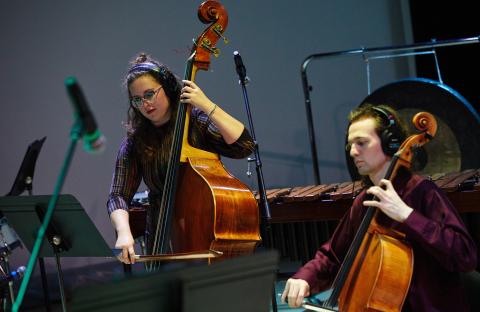
While the traditional notion of conservatory music education might conjure images of narrowly focused study of centuries-old works by classical composers, Boston Conservatory at Berklee’s Music Division reimagines this model, immersing students in a dynamic range of music-making that embraces contemporary creative expression and experimentation. By working directly with living composers and renowned ensembles representing a diversity of aesthetics, cultures, and perspectives, students emerge as professional musicians deeply connected to today’s musical and cultural landscape—and a strong sense of their artistic identity as global artist-citizens.
Here are five reasons Boston Conservatory is placing its students at the forefront of all that is new and innovative in classical music today.
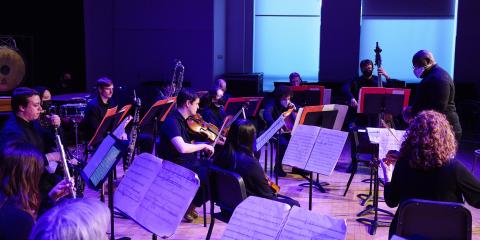
The globally acclaimed Ensemble intercontemporain perform with Conservatory students and faculty at the 2022 New Music Festival.
1. Boston Conservatory students work directly with leading ensembles and artists.
Rehearsing and performing alongside world-class artists not only inspires students, it teaches them applicable skills in all areas of professional music, from instrumental technique to creative expression to career development. Through artist residencies, workshops, and master classes, Boston Conservatory provides students with unparalleled access to their role models.
In winter 2022, the Conservatory hosted five members of the globally acclaimed Ensemble intercontemporain. This contemporary music ensemble, resident at the Philharmonie de Paris, is the world’s preeminent group devoted to the performance of contemporary classical music. Emmanuelle Ophèle (flute), Jens McManama (horn), Hidéki Nagano (piano), Samuel Favre (percussion), and John Stulz (viola) performed two concerts with Conservatory students, faculty, and alums during the 2022 New Music Festival. They also held workshops with student composers, providing feedback on their work.
Other recent visiting artists of note include Susan Botti, Julia Bullock, Nico Muhly, and Time for Three, to name a few.
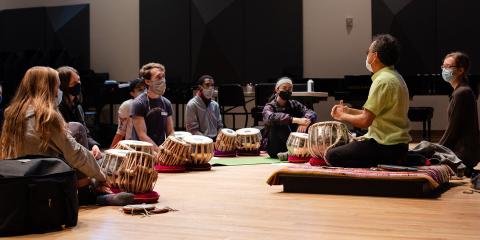
Silkroad artist and world-renowned tabla master Sandeep Das gives Conservatory students a tabla lesson.
2. Boston Conservatory’s unique partnership with Silkroad expands creative horizons with a global perspective.
Famed cellist Yo-Yo Ma founded the Silkroad collective as “an exchange of ideas, tradition, and innovation”—a vision that aligns beautifully with Boston Conservatory at Berklee’s core values. So it made perfect sense for the two institutions to officially join forces in 2018, creating an educational partnership that enriches Conservatory students’ artistry with a global perspective, expands their improvisation skills, and exposes them to new and unique repertoire from around the world.
As part of this partnership, students from the Music Division and beyond can take the Silkroad Creativity Lab, a semester-long course taught by Silkroad artists, which emphasizes collaboration, deep listening, and artistic risk-taking. In addition to this course, students have the opportunity to attend workshops, rehearse, and perform with Silkroad artists.
Maya Giles (B.M. 21, violin) says her experience with Silkroad transformed her approach to music-making. “It was life changing. They shared with us their deep connection with their cultural and ancestral roots—how it informs their practice, performances, and work,” Giles says. “I was encouraged to play directly what was in my soul and, with it, connect with musicians next to me.”
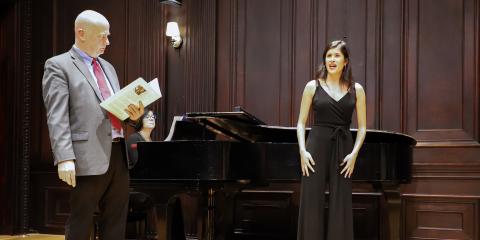
Composer Tom Cipullo, who was an artist in residence when Boston Conservatory performed his opera 'Glory Denied,' works with an opera student during a master class.
3. Students perform works by living composers—and learn directly from them.
“Collaboration and creation are central to what we do as performing artists,” says Michael Shinn, Boston Conservatory at Berklee dean of music. “Nowhere is this more acutely impactful than in the preparation of a new score with the composer directly… it leads to deep connections between composer and performer.”
Boston Conservatory offers students the opportunity to work closely with professional composers through residencies with leading artists like Saunder Choi, Nico Muhly, and Melissa Dunphy. The experience not only gives students fresh insight into the composer’s work, it also cultivates professional communication skills that will serve them throughout their careers.
In many cases, the featured composers in the school’s music performances are Conservatory students themselves. Both undergraduate and graduate composition students work closely with the Conservatory’s ensembles to refine their work and bring it to life. “A composer must learn what is involved in getting the music off of the page,” says Jonathan Bailey Holland, Boston Conservatory at Berklee chair of composition, contemporary music, and core studies. “The more they hear their ideas realized, the better they will be able to ‘hear’ them in the future as they are composing.”
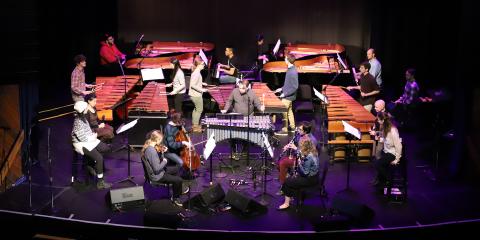
Boston Conservatory students perform Steve Reich’s minimalist masterpiece 'Music for 18 Musicians.'
4. Boston Conservatory’s annual New Music Festival showcases the best in contemporary classical music.
Every winter, Boston Conservatory shines a spotlight on important compositional voices of the late 20th and early 21st centuries. The annual New Music Festival features work from a wide range of established composers—alongside world premieres by the Conservatory’s own students.
Bailey Holland says it’s crucial for the Conservatory’s students to take an expansive approach to listening—and the New Music Festival plays an important role in that mission. “With contemporary work, we must reach far to hear as much music as we can, as often as we can,” he says.
In conjunction with the 2022 festival, Boston Conservatory hosted a residency with Australian-American composer Melissa Dunphy, perhaps best known for her 2009 “docu-opera,” The Gonzales Cantata. Members of the world-renowned Ensemble intercontemporain also were in residence for the festival, performing works by the group’s founder, Pierre Boulez, and by French composer Gérard Grisey, an innovator in the realm of spectral music.
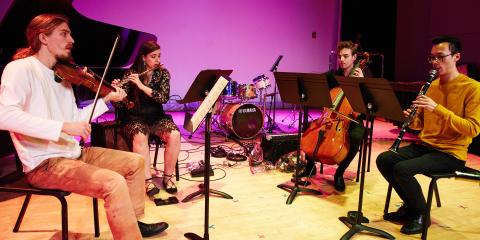
The Conservatory’s contemporary classical ensemble contraBAND performs a program titled A Woman Sees How the World Goes with No Eyes, featuring multidisciplinary avant-garde works composed by women.
5. Boston Conservatory’s innovative programs prepare students to shape the future of music.
Boston Conservatory takes a forward-thinking approach because innovation is essential to keeping the arts alive and engaged with the world we live in. “Cultural relevance is critical to our success as artists,” Shinn says. “This can take the shape of revisiting canonic works through a modern eye; training our students to engage with technology for the betterment of music; or ensuring our curriculum remains relevant in the modern world, with a focus on diversity and inclusion.”
Our graduates are actively contributing new music to today’s classical landscape. Elijah Daniel Smith (B.M.'17, composition) recently premiered his original piece, Scions of an Atlas, with the Chicago Symphony Orchestra as part of the CSO’s MusicNOW series. Mason Bynes (M.M. '21, composition) serves on the film/tv composition team at Raging Cloud Studios—in addition to her commissions by ensembles around the U.S., including her piece, “For Rosa,” recently commissioned for the unveiling of the Rosa Parks memorial at the Rosa Parks Museum in Montgomery, Alabama. And a team of recent alumni recently founded their own independent opera company. Greg Nahabedian (M.M. '18, composition), Joshua Scheid (M.M. '17, contemporary classical music, P.S.C. '18, voice), Felix Tomlinson (B.M. '20, voice), and Erin Matthews (M.M.'18, opera) established Strange Trace in 2020 “to holistically redefine the experience of opera.”
Learn more about Boston Conservatory’s leading music programs.
